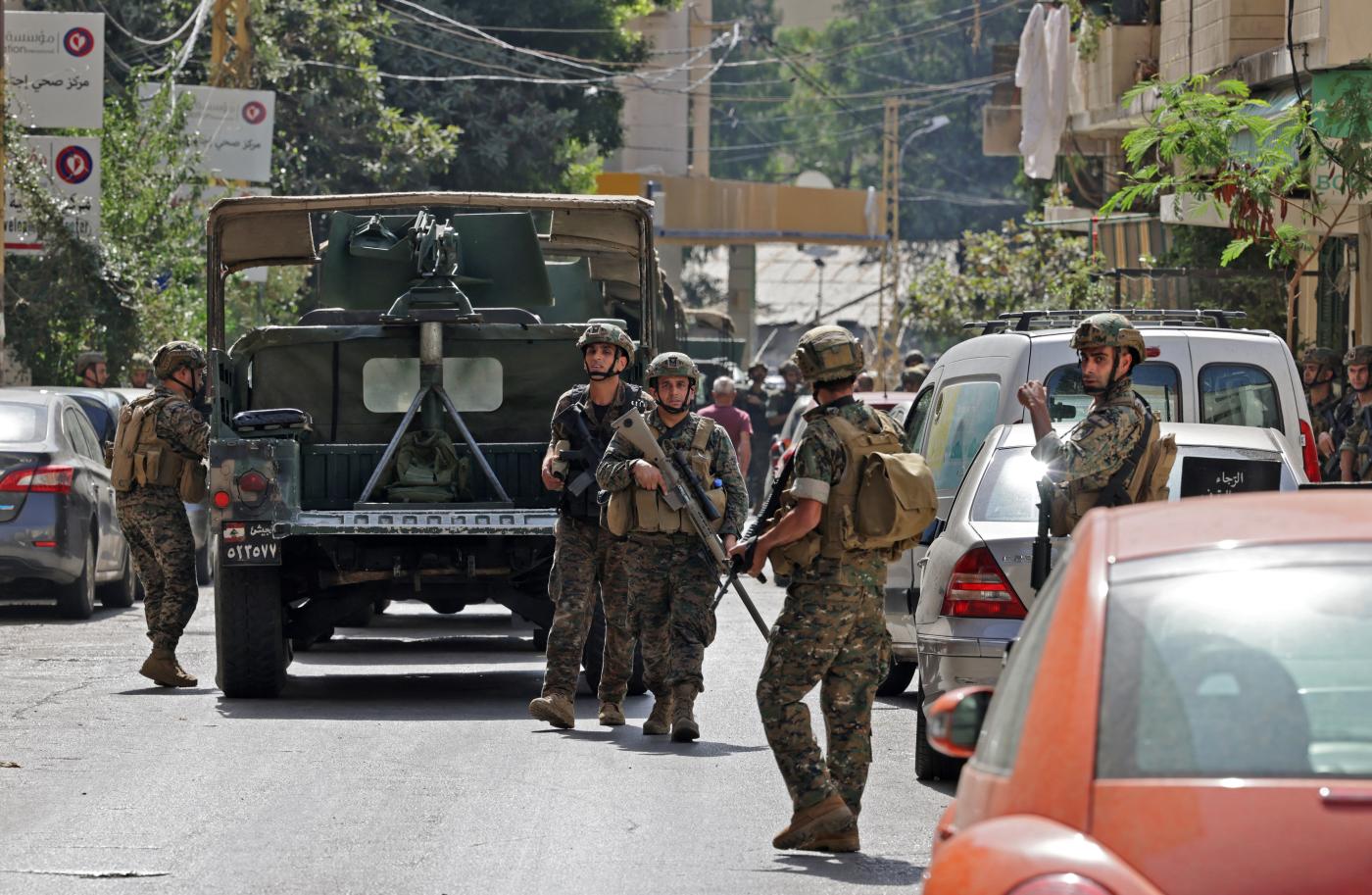
By Joseph Haboush, Al Arabiya English — As Lebanese soldiers communicated during a counterterrorism simulation, American troops stood on a hilltop in northern Lebanon to observe an operation that marked the culmination of a two-week training exercise. Around 60 US personnel from the Navy, Marines, Army and Coast Guard participated in Resolution Union 2022, an annual exercise between the two armies focused on maritime security operations, mine countermeasures and explosive ordnance disposal. The live-fire event saw various branches of the Lebanese Armed Forces (LAF) integrate air, naval, and ground capabilities during the operation.
Three separate operations were carried out in the exercise: long-range fire on hostile and terrorist targets using various tanks; closing in on a building housing a senior terrorist leader using ground and air support; chasing down a boat that was believed to have been used for the terrorist leader to escape the raided building; visit, board, search, and seizure (VBSS) of a ship used for smuggling; a rescue operation of injured personnel on board the vessel during the VBSS; and helicopter missile fire at a target on land. “This is a pretty sophisticated performance,” one senior US military member told Al Arabiya English. “This takes a high level of professionalism and education.” The military official, speaking on condition of anonymity because they were not authorized to speak, lauded the LAF as being “one of the more advanced armies in the region.” The US military is one of the top in the world in integrating different attack and defense methods. Now they are trying to help other countries do the same to counter drug trafficking and terrorism while working to integrate the air defense systems of more advanced militaries in the region.
Since 2006, the US has invested over $2.5 billion in the LAF, which has used this training and weaponry provided by Washington to defeat an extremist militant organization in the Nahr al-Bared refugee camp in 2007 and become one of the first armies in the region to push ISIS entirely out of it borders in 2017. But there have been mounting concerns over the LAF’s ability to decide between war and peace, which the Iran-backed Hezbollah arguably has complete control over. Nevertheless, US support has continued to bolster the LAF and this has been observed as recently as this month when American lawmakers agreed to reroute US taxpayer funds to include “livelihood support” for Lebanese soldiers.
This comes as Lebanon faces an unprecedented economic, financial and social collapse, one of the worst the world has ever seen, according to the World Bank. In 2020, the LAF stopped serving meat in all of its meals for soldiers on duty due to the economic crisis. The support is for six months and will help Lebanese soldiers “put food on the table,” one US official previously told Al Arabiya English. While there has been overwhelming bipartisan US support for the LAF, some analysts and officials anticipate a cut in US funding for Lebanon next year with the expected Republican takeover of the House and the Senate.
Republicans have long criticized Hezbollah’s growing influence in Lebanon and the fact that it has permeated nearly every public institution in the country. “The LAF has historically served as a pillar of stability in a country facing extraordinary challenges, including the presence of the terrorist group Hezbollah,” a fact sheet from the State Department says. Just this month, Hezbollah’s secretary-general threatened to start an all-out war with Israel just as US mediation efforts appeared to be heading for a breakthrough on the Lebanese-Israeli maritime border dispute. Hezbollah chief vows ‘no one’ will extract oil from maritime zones if Lebanon barred But this hasn’t stopped the Pentagon and State Department from pushing ahead with their efforts to strengthen the LAF. Sleeper cells inside the country and the ISIS threat still looming in Syria have seen US officials double down on their calls to ensure that the LAF is ready and capable of fighting back and defeating these groups. At the same time, bolstering the LAF’s capabilities ensures that the US has another regional partner that it can count on in its global fight against terrorism.
Narcotics trafficking is another area where the LAF is being pressed to do more. Most of Captagon, an amphetamine-type stimulant, is produced in Syria and Lebanon, and smuggled to its primary consumer market in the Gulf. Gulf states have stepped up efforts to stop this narcotic from penetrating their borders. Saudi Arabia said it seized close to 120 million pills last year. US Coast Guard ships in Beirut Two US Coast Guard fast response cutters arrived in Beirut on Monday, marking their first stop in the Middle East after departing the US.
While in Beirut, crewmembers will meet with Lebanese Navy counterparts on subjects related to shipboard operations, safety and damage control, the US Navy said in a statement. “The ships are forward-deployed to US 5th Fleet to help ensure maritime security and stability across the Middle East,” the statement read. The US 5th Fleet operating area includes 21 countries, the Gulf, Gulf of Oman, Red Sea, parts of the Indian Ocean and three critical choke points at the Strait of Hormuz, Bab al-Mandeb and Suez Canal. The cutters that arrived in Beirut had advanced communications systems and improved surveillance and reconnaissance equipment.



